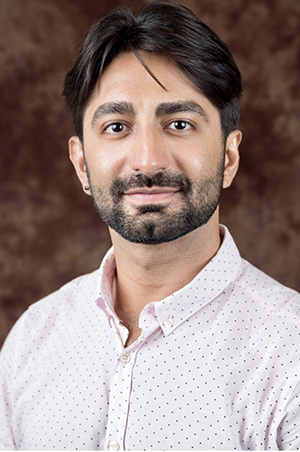Diversifying the learning experience
By Emily Leighton, MA’13
 For $17 on Amazon, Play Doh’s ‘Drill n’ Fill’ set offers a classic set of tools to play dentist. “Keep the fun buzzing and fight cavities with the electric drill,” reads the description.
For $17 on Amazon, Play Doh’s ‘Drill n’ Fill’ set offers a classic set of tools to play dentist. “Keep the fun buzzing and fight cavities with the electric drill,” reads the description.
Drill-and-fill dentistry has been a standard of practice for more than 50 years and it’s likely what many of us imagine when we think of visiting the dentist – a masked figure standing over us with power tools and metal instruments in hand.
But Dr. Abbas Jessani says dentists are not simply mechanics of the mouth. The profession is evolving beyond treating only the symptoms observed in the dental chair. What patients experience in their home environments, their lifestyle choices and psychosocial factors are all increasingly important considerations for dentists.
“The goal is to understand these risk factors and tailor treatment,” Dr. Jessani explained. “We need to understand each person’s journey and how it plays a role in the dental diseases they present with.”
Dr. Jessani is bringing this evidence-based, person-centred approach to his new role at Schulich Dentistry, having joined the faculty in September as an Assistant Professor in Operative Dentistry and Director of Dental Outreach and Community Service.
As a combined medical and dental faculty, he says the School provides exciting opportunities to work and teach within an interprofessional and interdisciplinary environment. “Conventionally, dentistry has been its own structure, but it is part of the primary health care model and a primary dental care provider can serve as a gateway to the health care system,” he said. “I’m looking forward to expanding my horizons and working collaboratively with other health experts.”
Born and raised in Pakistan, Dr. Jessani completed an undergraduate dental degree at the University of Karachi in 2011. He moved to Canada to pursue graduate training at the University of British Columbia, focusing his MSc and PhD studies on access to dental care for vulnerable populations, such as pregnant women and people living with HIV.
After graduating, Dr. Jessani accepted a full-time faculty position at the University of Saskatchewan’s College of Dentistry, working there for two years in restorative and public health dentistry.
As Director of Dental Outreach and Communty Service at the School, he plans to build on the success of the Dental Outreach Community Service (DOCS) program by focusing on new patient populations across Southwestern Ontario.
“The goal is to expand care among urban and rural populations, to expose students to a wider spectrum of disparities and patient care issues,” he said. “We want to diversify the learning experience, provide the most current and evidence-based clinical training to our students, as well as fulfill the School’s commitment to social accountability.”
In order to build successful community partnerships, Dr. Jessani emphasizes the principles of evidence-based dentistry and participatory research – asking what community members need and involving them in developing solutions and knowledge dissemination.
“It’s a symbiotic relationship, serving the community with the best care and providing real-world experience for students,” he said.
Dr. Jessani was first inspired to pursue community outreach as a dental student in Pakistan, observing the economic and social barriers to oral health care faced by many. “Dentistry is considered a service available only to the upper class in Pakistan,” he explained. “When I moved to Canada, I realized that things are not all that different here. We have a publicly funded health care system that does not cover primary dental care, leaving many people with unmet oral health needs.”
This perspective shapes his teaching philosophy, which focuses on risk-based, person-centred care. “Students are treating a person, not just a patient, so I want them to understand who they are treating and the potential risk factors,” he said. “I want them to think outside the box.”
Dr. Jessani is also hoping to incorporate self-reflection and narrative practices within the curriculum, providing space for students to think about how past experiences impact them as dental professionals, as well as assess their own learning and progress.
Moving to a new academic institution and province during the COVID-19 pandemic presented challenges, but Dr. Jessani says the support he received from the School community was phenomenal. “The whole hiring process occurred online, so I stepped on Western’s campus for the first time when I arrived in September,” he said. “I’m very grateful and excited to be part of advancing dental education and training at the School.”








